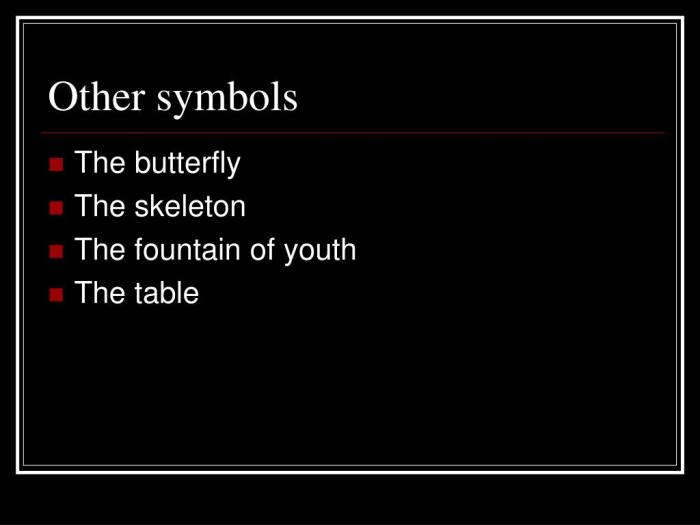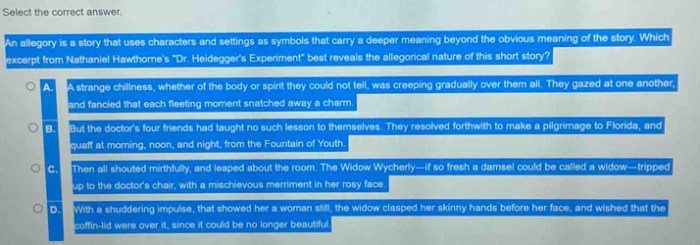Symbols in dr heidegger’s experiment – Symbols in Dr. Heidegger’s Experiment take center stage, inviting readers into a realm of wisdom, folly, and the elusive pursuit of eternal youth. This captivating tale by Nathaniel Hawthorne weaves a tapestry of profound symbolism, delving into the human condition and the consequences of tampering with nature.
Through the lens of symbolic objects, characters, themes, and visual elements, the story explores the complexities of human nature and the enduring cycle of life.
Symbolic Objects

In Nathaniel Hawthorne’s “Dr. Heidegger’s Experiment,” various objects serve as potent symbols, enriching the story’s themes and characterization.
The Wine
The ancient wine, a gift from Ponce de Leon, represents the allure of eternal youth. Its ruby-red color evokes the blood of life and the promise of rejuvenation. When consumed, the wine initially revitalizes the guests, restoring their youthful appearance and vigor.
The Water from the Fountain of Youth
The water from the Fountain of Youth, a mythical source of immortality, symbolizes the ephemeral nature of youth and the futility of trying to escape the natural cycle of life. While it initially rejuvenates the guests, its effects are temporary, and their bodies quickly deteriorate.
The Portraits in Dr. Heidegger’s Study
The portraits of the guests’ younger selves in Dr. Heidegger’s study represent their past, lost youth. These portraits serve as a constant reminder of the passage of time and the inevitability of aging.
Symbolic Characters

Dr. Heidegger
Dr. Heidegger embodies both wisdom and folly. As a learned man, he possesses knowledge of the ancient wine and the Fountain of Youth. However, his attempt to manipulate nature through his experiment demonstrates his hubris and lack of foresight.
The Four Guests
The four guests represent different aspects of human nature:
- Mr. Medbourne: Intellectual curiosity and ambition
- Colonel Killigrew: Military prowess and youthful vitality
- Mr. Gascoigne: Wealth and social status
- Miss Sylvia Ward: Beauty and vanity
The Mysterious Stranger, Symbols in dr heidegger’s experiment
The mysterious stranger represents the wisdom of experience and the futility of chasing youth. He warns the guests of the consequences of their experiment and advises them to accept the natural cycle of life.
Symbolic Themes

The Pursuit of Eternal Youth
The story explores the consequences of the pursuit of eternal youth. The guests’ desire to recapture their lost youth leads to their downfall, demonstrating the futility of trying to escape the natural order.
The Dangers of Tampering with Nature
Dr. Heidegger’s experiment serves as a warning against the dangers of tampering with nature. By attempting to manipulate the natural cycle of life, he unleashes unforeseen consequences that ultimately harm his guests.
The Importance of Accepting the Natural Cycle of Life
The story emphasizes the importance of accepting the natural cycle of life. The mysterious stranger teaches the guests that true wisdom lies in embracing the present moment and accepting the inevitability of aging.
Visual Symbolism

| Symbol | Significance |
|---|---|
| The Ancient Wine | The allure of eternal youth |
| The Water from the Fountain of Youth | The ephemeral nature of youth |
| The Portraits in Dr. Heidegger’s Study | The passage of time and the inevitability of aging |
| The Mysterious Stranger | The wisdom of experience and the futility of chasing youth |
| The Setting (Old House, Gloomy Chamber) | The decay and decline of the guests’ lives |
Question Bank: Symbols In Dr Heidegger’s Experiment
What is the significance of the wine in the story?
The wine represents the elixir of youth, offering a glimpse of the transformative power of nature.
How do the four guests symbolize different aspects of human nature?
The guests embody traits such as vanity, greed, ambition, and skepticism, representing the diverse facets of human character.
What is the role of the mysterious stranger in the story?
The stranger serves as a catalyst, challenging the guests’ beliefs and ultimately revealing the folly of their pursuit of eternal youth.
